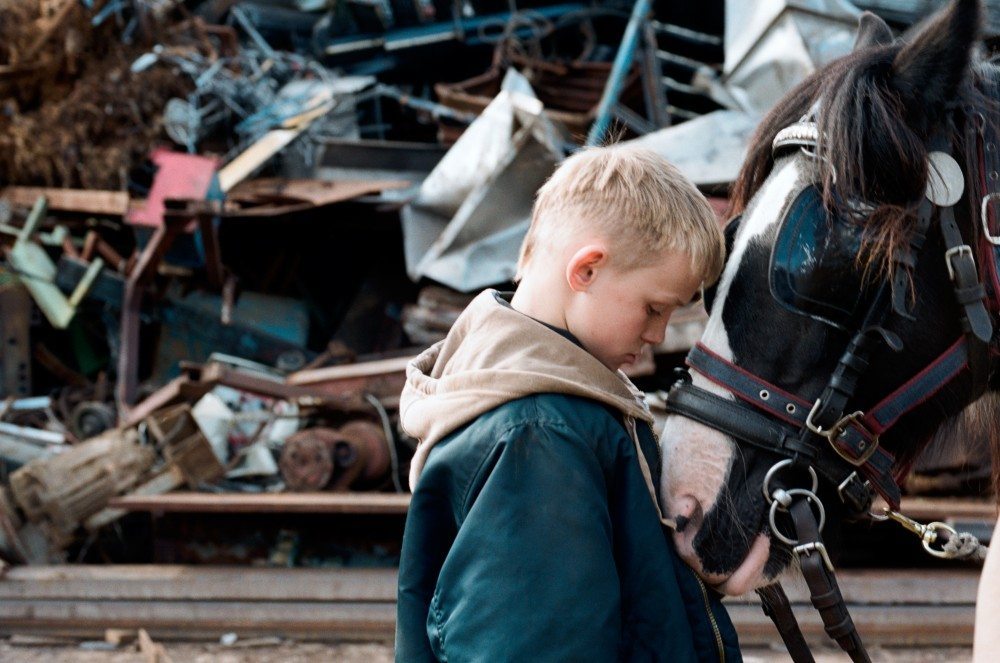The Selfish Giant
Director: Clio Barnard
Cast: Connor Chapman, Shaun Thomas, Sean Gilder
Length: 91 minutes
Country: UK
At first, the idea of Oscar Wilde’s fairytales re-imagined for contemporary Britain sounds quite cheesy. One could easily conjure the image of a roaring London and the exaggerated tenderness of the Happy Prince, probably as an understated clerk in the city waiting for someone to save his life. Instead, director Clio Barnard has re-imagined the tale of the giant and his garden in suburban and industrial Bradford. Bearing this in mind, I approached the film with curiosity. And I was not disappointed.
The Selfish Giant continues the socio-realist tradition of contemporary British drama, displaying a non-sugarcoated routine of characters that mainstream cinema often marginalises, this time with two boys – Arbor (Connor Chapman) and Swifty (Shaun Thomas). Arbor is extremely loud and aggressive yet his loyalty to Swifty, a much slower, bigger and gentler boy is unquestionable. The first scene of the film establishes the binaries and themes that will be explored throughout it: Arbor and Swifty ride a horse through a dark field towards railway tracks only to find a gang of men stealing industrial wire. They snatch the wire and run away. The lighting of the shots suggest a stark contrast between the liberating connection with nature and the cold world of industry. However, it is exactly the world that the boys have to engage in to support their families as both of them struggle financially. The centre of this world is the scrapyard, guarded by a tired looking man named Kitty (Sean Gilder). After a violent incident in the schoolyard in which Arbor protects Swifty from a gang of bullies, they become excluded from school and can dedicate their whole time to this activity. However, it is not as simple as it seems: even though they are trying to assume the roles of men, they are just boys.
The Selfish Giant is a strong bleak film, its strength lies exactly in its bleakness and the relentless pursuit of the so hard to grasp reality.
It seems to me that this film bears a connection with Tyrannosaur, the 2011 film by Paddy Considine. Both films share the same idea: giving voices to marginalised stories, however, they engage in different material. Tyrannosaur depicts a woman, trapped in a violent marriage, establishing a relationship with a lonely bachelor. Conflicts are resolved in raging violence and self-destruction. The Selfish Giant portrays boys who will grow up to be men and their surroundings. Their domestic space is chaotic. Arbor’s family is missing a father and the lead brother stuck in debts placing them in danger. Swifty’s father is a violent man, resolving debts by selling their own furniture. The women in the film (I counted four) are submissive and powerless. Yet I do not think this can be considered sexism – I believe this is a representation of the world Arbor and Swifty are growing up in, surrounded by failing masculinity and submissive femininity. These examples will result in violent marriages and raging self-destruction, with themselves taking the roles of their fathers. And the cycle of violence and misunderstanding will go on and on.
A question one may ask is the intention of the film. Is it out there to provoke empathy or to provide a social analysis? Even though it is filled with comic mise-en-scène and little jokes, it essentially remains bleak and relentless. It does not try to compensate the greyness of the suburban and industrial shots with scenes set in nature, as even the fields are infected by wires and electricity. The cinematography is fast-paced and sharp. Even though Swifty is a gentle character, Arbor does not provoke sympathy; in fact, he is extremely annoying. However, the film’s goal is not to provide judgement – the sum of all these elements creates an alienating effect and provokes reflection on the socio-economic realities of the people faced with challenges that are far beyond their years and experience.
The Selfish Giant is a strong bleak film, its strength lies exactly in its bleakness and the relentless pursuit of the so hard to grasp reality. Oscar Wilde would definitely be proud.

Comments